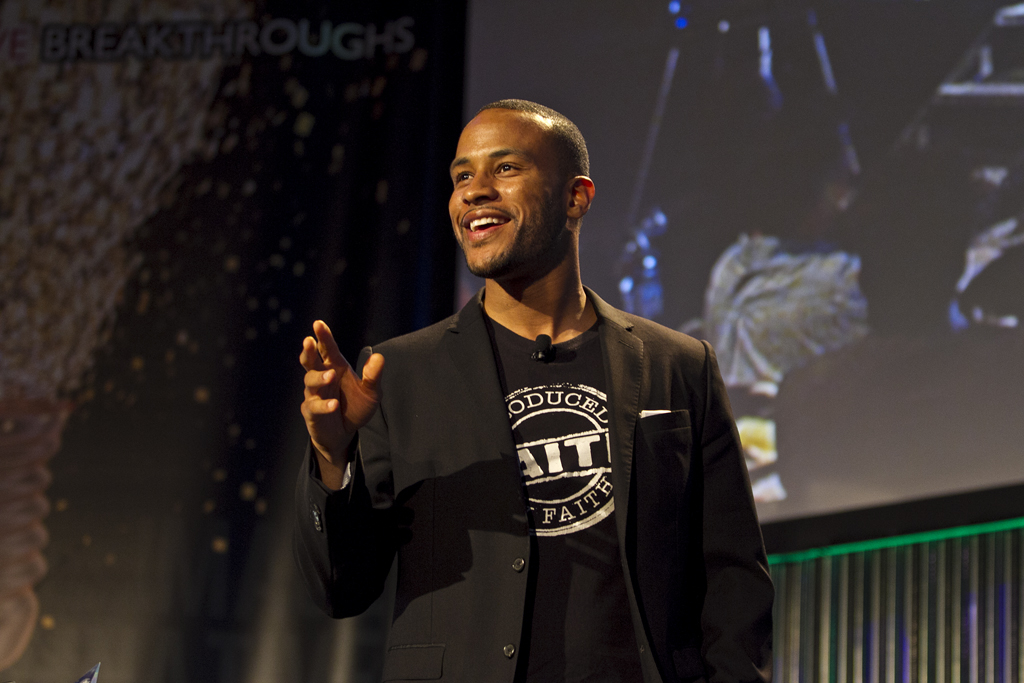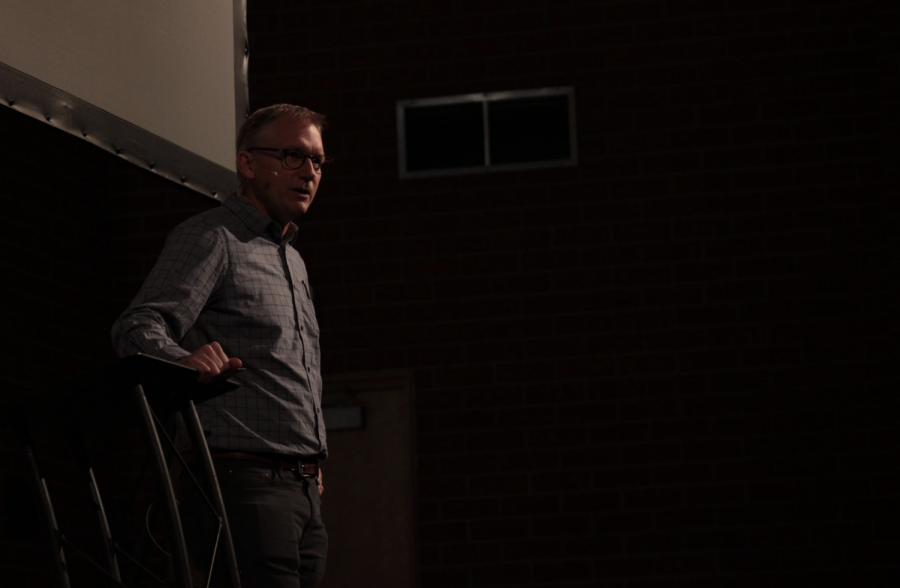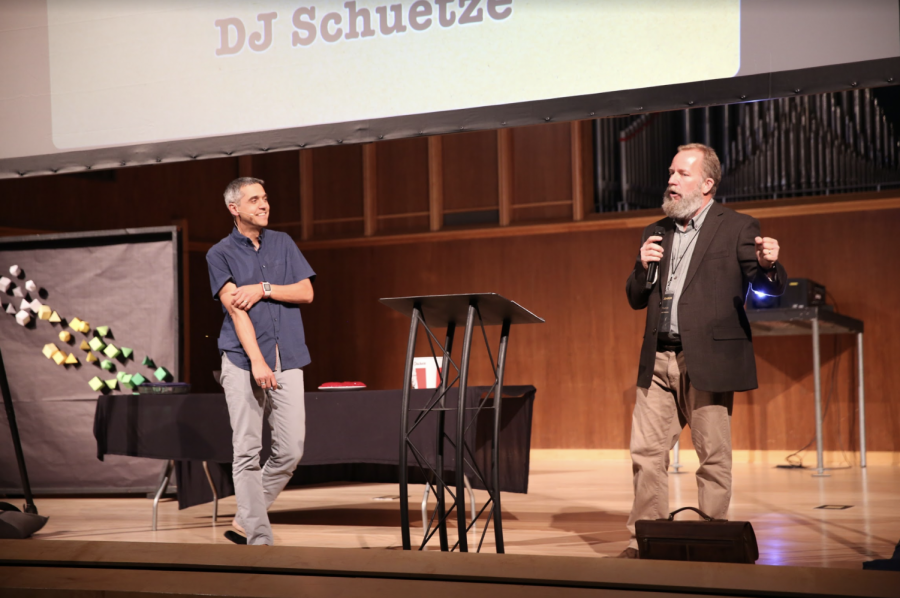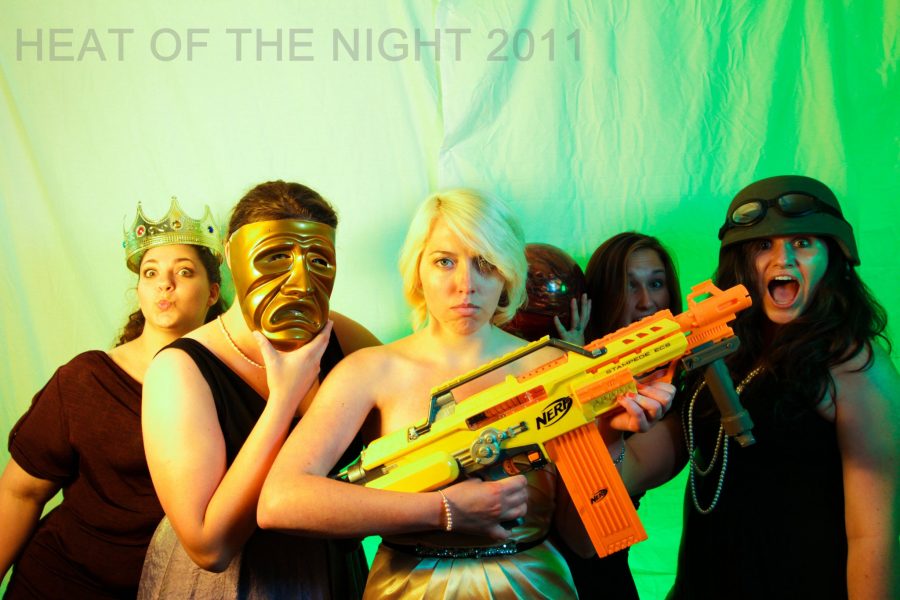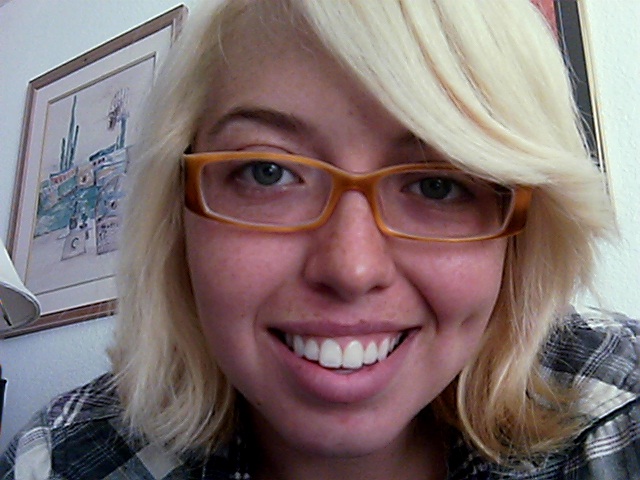Opening session focuses on cultivating creativity
Stan Williams, renowned author of “The Moral Premise” and media consultant, began the Biola Media Conference by interviewing Monica Macer who was on the writing team of “24” and “Prison Break” and Steve Taylor, producer of “Blue Like Jazz.” The questions ranged from personal convictions about media and how they see God using their talents to their past, present and future endeavors.
C. McNair Wilson, a member of the Imagineer team at Disney, spoke next about recapturing one’s creativity. He said that, according to anthropologists, children 3 years old and younger have an entire expressed imaginative capacity; by age 5, they begin to lose it. When you graduate high school, your creative capacity has reduced between 70 and 90 percent. He encouraged the audience to be creative by saying, “Don’t talk about it, do something!”
He proceeded to give four points to becoming more creative. The first was to take more risks — to begin a project without a plan. The second was to challenge assumptions. He defined assumptions as “the laws we really live by.” He then encouraged the audience to stay curious and finally to challenge themselves to see things differently.
First sessions address pitches, producing short form content and funding films
The first workshop option was “How to Perfect Your Pitch” by Dan Ewald and Rajeev Sigamoney of “Jesus People.” Ewald advised working with a team of writers and creative people; this way, when giving a pitch, you could play off of each other and make executives more at ease. He said that each pitch should cover what the genre of the movie or sitcom idea is, what the setting is, who the main character is and what the general story line would be. He then defined the key difference between a movie and a sitcom: A movie follows the story of one person, while a sitcom follows the story of as many as seven people.
Dean Yamada and Kevin T. Willson made up a panel for the second workshop, during which time they discussed “Finding Your Creative Breakthroughs As A Director.”
The third workshop,”Finding Your Creative Breakthroughs As A Producer of Short Form Content,” featured a panel consisting of Susana Zepeda, Joshua Sikora and Bub Kuns. They talked about how to use Hulu to display your work and how to write, shoot and edit content specifically for Hulu. Zepeda advised not to limit yourself to working with networks, but that you should also create for Hulu; Hulu is allowed to take more creative approaches without a network’s supervision. The panel closed the session by saying that it’s not what you pitch, it’s what you show you can do online or digitally. Producers don’t want a script in short form videos, they want an example.
The fourth workshop, “Finding Your Creative Breakthroughs in Getting Greenlit,” covered various ways to fund a film and how to get certain mediums to air a film. Cindy Bond and Chevonne O’Shaughnessy were the speakers — they started a company called Greenlit, which focuses on selling faith-based content internationally. Bond said that, amazingly, the majority of a $2 million movie could be funded by an international market.
Writers network by pitching to producers during second breakout session
The second breakout session began with Pitchfest. During Pitchfest, writers paid to be given two minutes to pitch their idea to a producer, two minutes to receive feedback from that producer, and six opportunities to talk to a different producer. Los Angeles native Tish Dragonette said she was participating in Pitchfest to make connections and get a producer interested in reading her script for her project. She expressed that it was such a blessing to be able to pitch her ideas in a safe environment. Likewise, Ian Eyre, creator of “Run Cholo Run” said that he was at Pitchfest to see if there was a chance he could get a follow-up meeting with a producer.
Wilson spoke again at the fifth workshop, “Recapturing Your Creative Spirit Part 2,” further elaborating on how to recapture one’s creative passion. He said that a person’s ideas, when properly stimulated, can end up multiplying to three-and-a-half billion ideas. He then took his audience through seven elements of the creative process including brainstorming and thinking critically and analytically. He emphasized that the idea better start out bigger than the budget, or that idea will fail.
Williams taught about key elements to have as a part of your plot if you want to be a successful screenwriter in Hollywood at the sixth workshop, “Finding Your Creative Breakthroughs As A Screenplay Writer.” He said that there has to be a natural and logical progression in stories and he highlighted certain cause-and-effect relationships in Hollywood. These included that a moral cause leads to a physical effect and that a protagonist’s thoughts precede their actions. He said that a character’s values need to motivate their actions. Williams pushed the idea that audiences want to see the protagonist improve on their journey because ultimately, the audience is looking for ways to improve themselves.
David Jacobson, Chris Herzberger, Laura Falcinelli formed a panel for the seventh workshop about “Finding Your Creative Breakthroughs As A Newbie in Hollywood.”
At the eighth workshop,”Finding Your Creative Breakthroughs As An Actor,” Mark Atterberry discussed how to break into Hollywood as an actor or actress. He said that you should not audition for your part, but that you should be yourself and audition for the producers — even if the producers do not like an actor for a particular part, they might like them for another. He encouraged aspiring actors and actresses to know who they are, embrace who they are, market who they are, and focus on their passion. They should know what three personalities they would be most talented in portraying and market them.
DeVon Franklin receives Biola Media Award
At the beginning of the closing session, Wilson had the audience take out a business card and a piece of paper. They were to complete the sentence, “I always wanted to ___ but I never did because ___,” on the paper, and then write their idea on the back of their business card. They then handed their card to someone they did not know. Wilson challenged everyone to contact the person with whom they had exchanged cards four times before May 5, 2013 in order to hold them accountable to accomplish their idea. He encouraged the audience to be themselves completely and thoroughly, for that is the definition of perfection.
Then president Barry Corey and Ray Rodriguez, co-owner and executive producer of Postmill, presented the Biola Media Award to DeVon Franklin, vice president of production for Columbia Pictures. Franklin quoted “Spiderman,” saying, “With great power comes great responsibility.”
Franklin proceeded to speak about the meaning of being a Christian in Hollywood. He said that in order to write stories that an audience can identify with, writers need to understand themselves and go back through their own stories. This will enable them to go back to their place of pain and write a story that can help another person. He also encouraged those aspiring to work in the media to put God first, always, and that if God’s people honor him, he will honor them.



